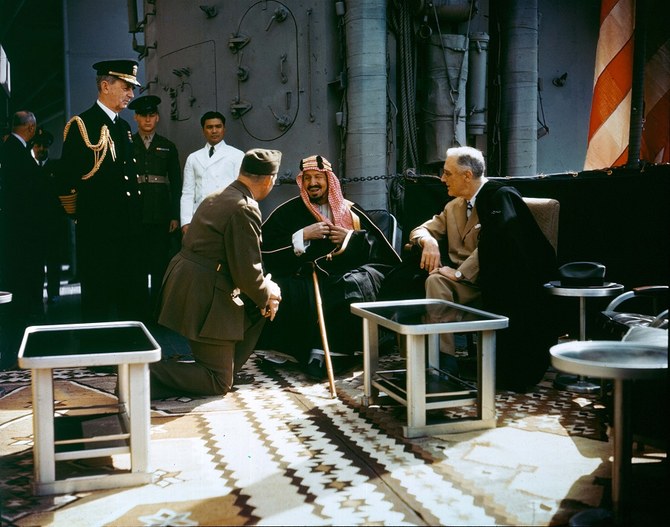RIYADH: After more than five years of World War II, there was nothing unusual about the sight of an Allied warship transiting the Suez Canal. But in the early-morning light of Feb. 14, 1945, any witness to the passage of the solitary US destroyer making its way from the Port of Suez toward the Great Bitter Lake could have been forgiven for dismissing what they saw as nothing more than a mirage conjured up out of the desert sands.
Beneath its shade, the armored decks were strewn with dozens of exquisite Oriental rugs, upon which was set an imposing gilded chair
The USS Murphy had seen exceptional service during the war, but nothing quite like the extraordinary mission on which it was now embarked.
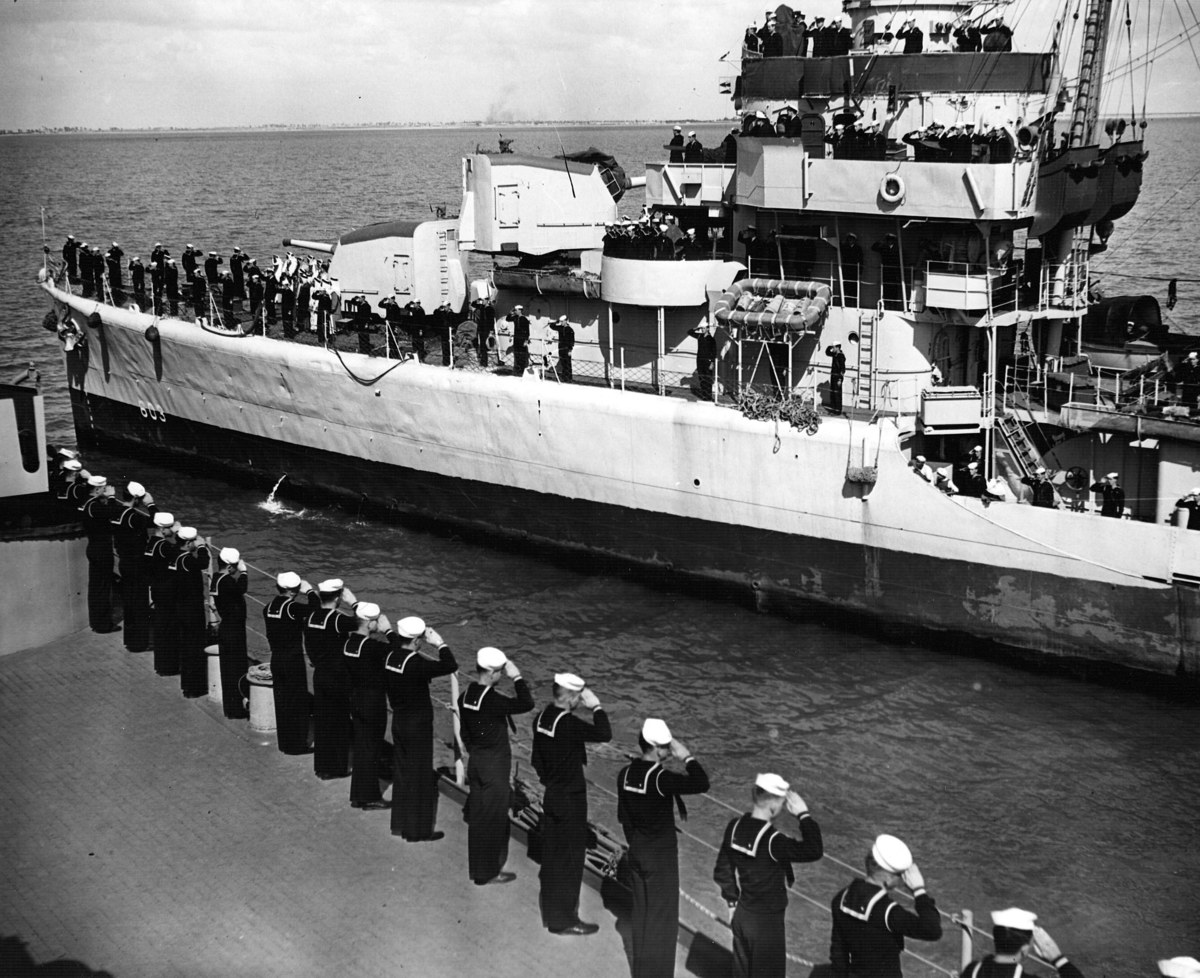
The USS Murphy carrying King Abdul Aziz and his entourage to the meeting with FDR at Great Bitter Lake, Egypt. (Franklin D. Roosevelt Presidential Library and Museum)
The entire foredeck was covered in a magnificent Arab tent, through the center of which the ship’s forward 5-inch gun pointed skyward, serving as the tent pole. Beneath its shade, the armored decks were strewn with dozens of exquisite Oriental rugs, upon which was set an imposing gilded chair.
But it was the occupant of that chair whose presence, had it been witnessed from the shore, might finally have convinced any onlooker of the unreality of the situation. On board the destroyer, having left his own land for the very first time and now making his way to a historic rendezvous with the US president, was none other than King Abdul Aziz, the founder of Saudi Arabia.
The 1,200-km voyage from Jeddah to the Great Bitter Lake, where Franklin D. Roosevelt was waiting on board the heavy cruiser USS Quincy, took just two nights and one day. But in making it, the king had taken the first historic step toward a relationship between America and his country that has endured for the past 75 years.
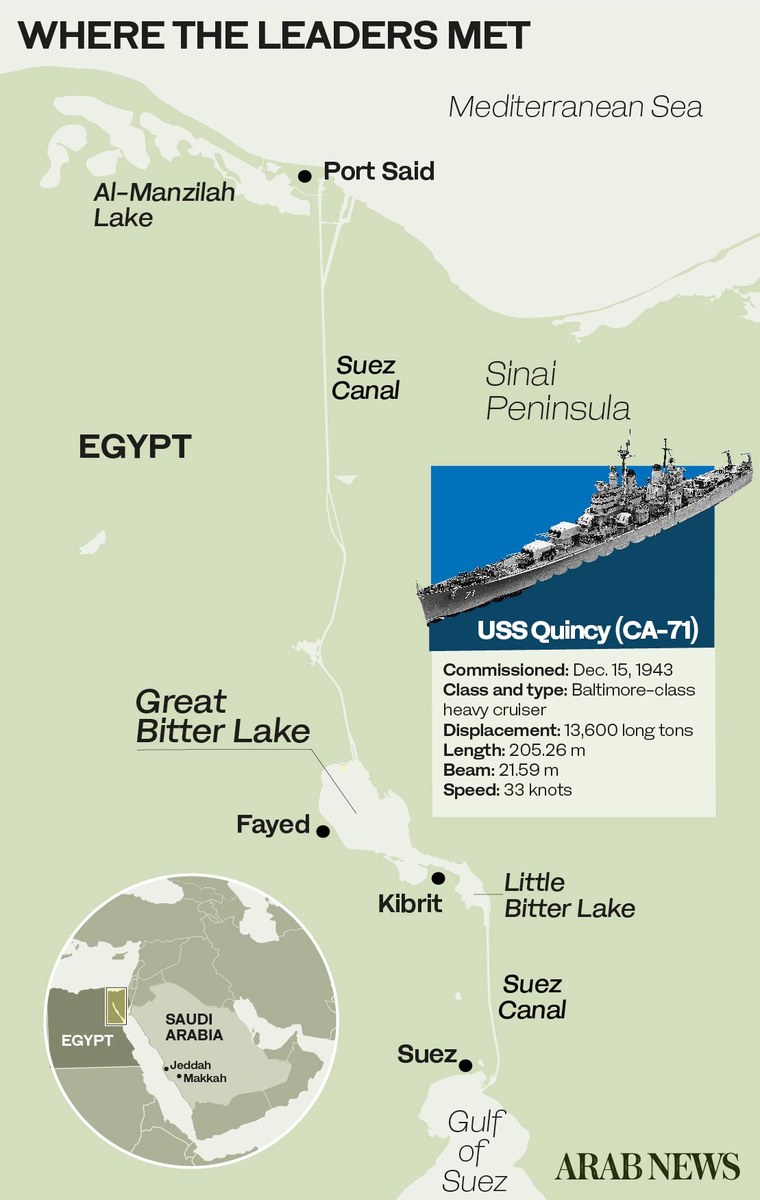
The voyage was not without considerable risk — America was, after all, still at war with Nazi Germany. In great secrecy, Roosevelt had stopped off in Egypt on his way back to the US from the Yalta Conference in the Crimea, where the “Big Three” Allied leaders — himself, UK Prime Minister Winston Churchill and Soviet Premier Joseph Stalin — had thrashed out a post-war plan designed to secure lasting peace.
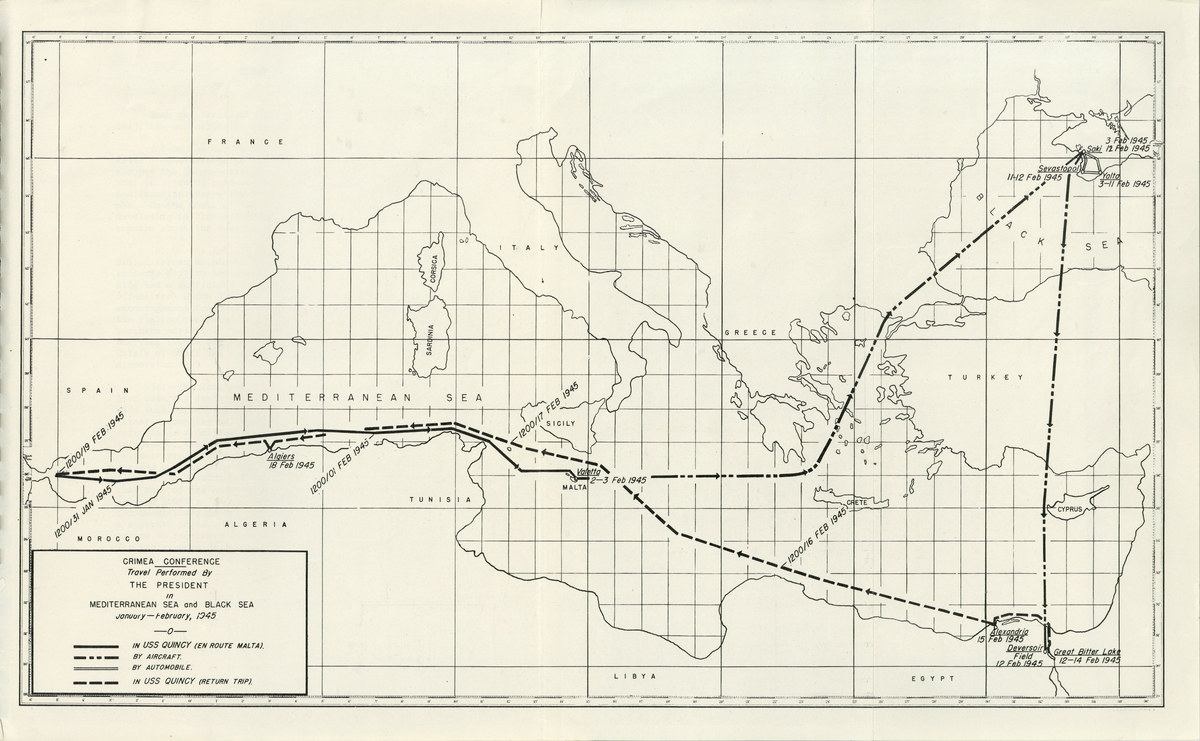
A map of the travel route to and from the Crimea conference. (Franklin D. Roosevelt Presidential Library and Museum)
In the words of retired US Marine Corps Col. William A. Eddy, the American diplomatic representative to the Saudi court who had been charged with arranging the meeting at short notice, “bombs were still being dropped on Cairo and on the Suez Canal, and a target more attractive to German bombers could hardly be imagined than a cruiser with the American President and the Arabian King on board.”
Eddy, a decorated veteran of World War I, had been born in Lebanon in 1896, the son of American Presbyterian missionaries who lived in Syria. From 1923 to 1928, he had taught English at the American University in Cairo and, fluent in Arabic, would serve as the sole interpreter between Roosevelt and King Abdul Aziz, commonly known as Ibn Saud.
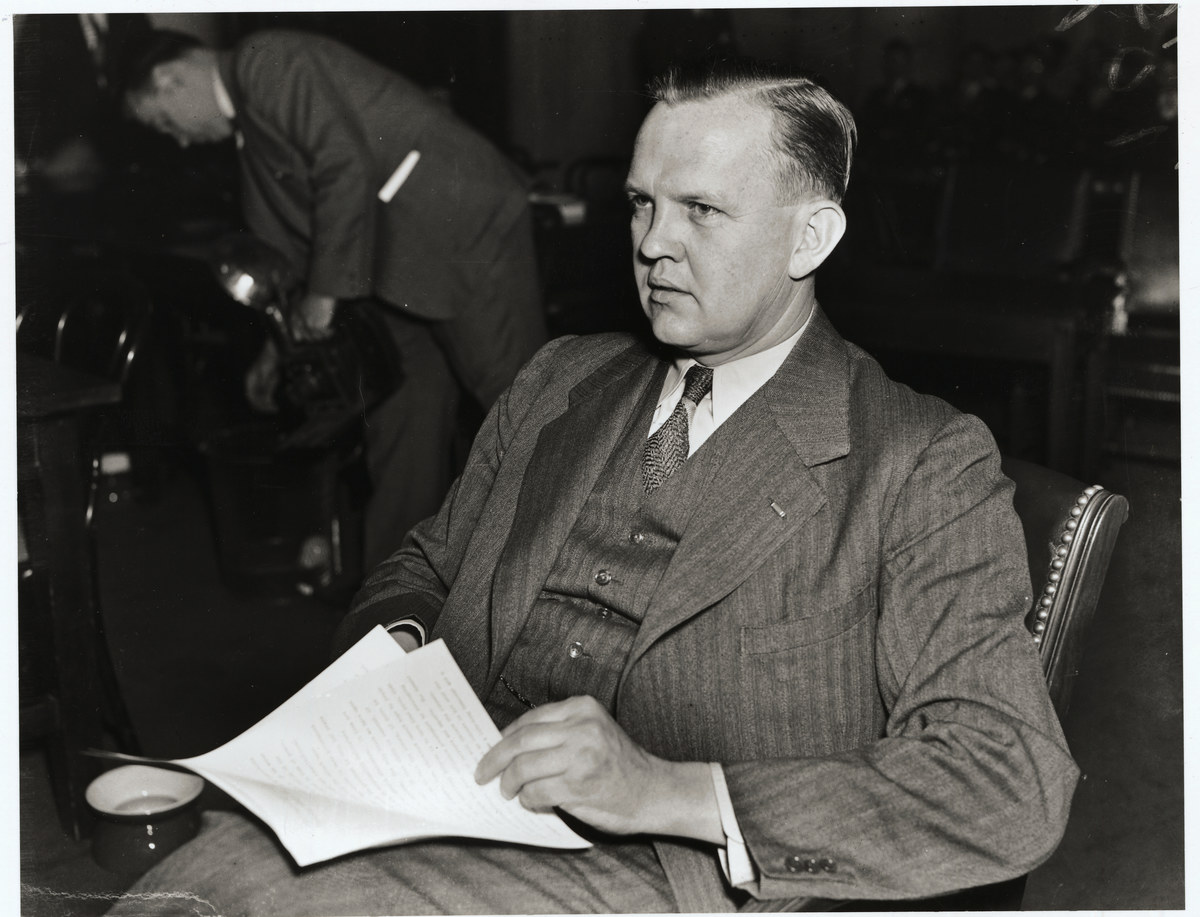
Retired US Marine Corps Col. William A. Eddy. (Getty Images)
In 1954, Eddy wrote the first account of the meeting between the two men and, from his opening words, his admiration for Ibn Saud was clear. The king, he wrote, “was one of the great men of the twentieth century,” who had “won his kingdom and united his people by his personal leadership.”
In Eddy’s eyes, Ibn Saud “excelled in the common tasks which all must perform. He was taller, his shoulders were broader, he was a better hunter, a braver warrior, more skillful in wielding a knife whether in personal combat or in skinning a sheep, he excelled in following the tracks of camels and finding his way in the desert. In him his subjects saw their own lives in heroic size, and therefore they made him their king.”
The meeting between Roosevelt and Ibn Saud was unprecedented, but had been set in motion over a year earlier by a visit to the US by two of the king’s sons, both future rulers of their country.
In September 1943, then-Saudi Foreign Minister Prince Faisal had traveled to the US, accompanied by his younger brother Prince Khalid. The two men — who visited Washington, New York and parts of the US southwest — were on an agricultural fact-finding mission. According to an account published in 2005 in The Link, the journal of the non-profit organization Americans for Middle East Understanding, “upon their return home, they reported favorably to their father, and also informed him that they had been told President Roosevelt enjoyed collecting stamps.”
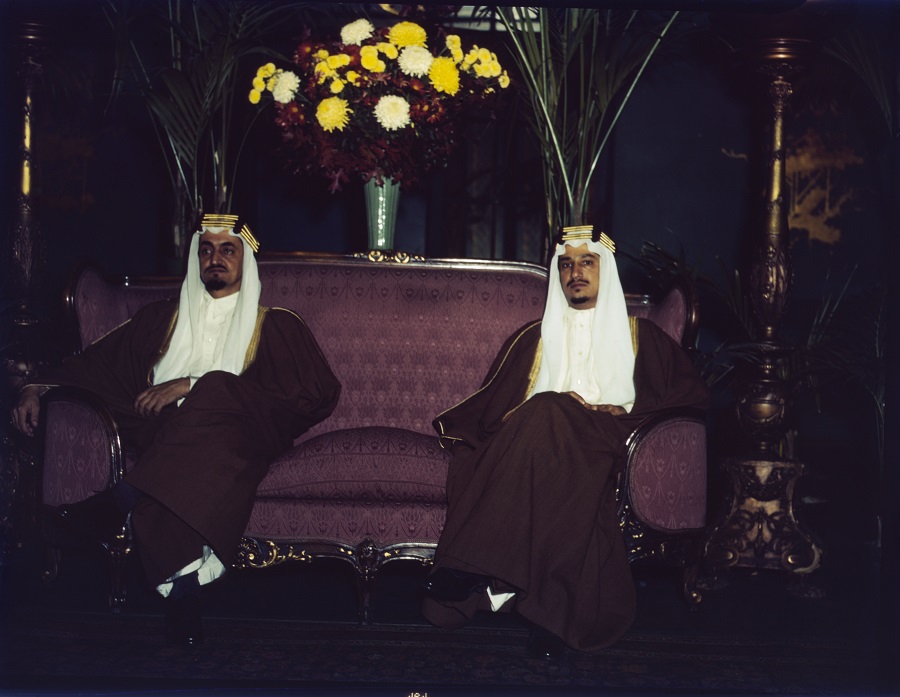
Prince Faisal and Prince Khalid, sons of King Abdul Aziz of Saudi Arabia, at their farewell reception in Washington DC in 1943. (Supplied)
That, wrote Thomas W. Lippman, a Saudi Arabia specialist at the Middle East Institute, “gave the king an opening to approach the president directly (and) he sent the president a set of Saudi Arabian stamps, then quite rare in the West.” The gift prompted a letter of thanks from Roosevelt, and the die was cast for the historic meeting.
In addition to the danger posed by marauding Luftwaffe aircraft, there was another good reason for the meeting’s secrecy. Roosevelt had promised Churchill that after the war, the US would not interfere in territory the British regarded as within their sphere of influence.
But in meeting with Ibn Saud, Roosevelt had two goals in mind, both of which trod heavily on Britain’s toes: His politically motivated determination to solve the Palestinian-Jewish problem, and the economic and strategic imperative of securing a post-war US relationship with Saudi Arabia, including, crucially, access to its oil.
The plan was for the USS Murphy to steam south from the Great Bitter Lake on the pretext of paying a courtesy call to the king in Jeddah, but in reality to pick him up and transport him and his retinue back up the Red Sea to his meeting with Roosevelt.
Preparations in Jeddah
On Feb. 11, the morning before the planned departure from Jeddah, Capt. B. A. Smith of the USS Murphy, accompanied by US Navy Commodore John S. Keating, came ashore to pay their respects to the king, Prince Faisal and the governor of Jeddah at the royal palace.
A few days earlier, Eddy recalled, Ibn Saud had traveled to Jeddah from Makkah for his annual visit to “meet the officials and notables of the province of Hejaz, receive petitions from his subjects, and distribute charity and food to the poor.”
Opinion
This section contains relevant reference points, placed in (Opinion field)
Equally few people on the Saudi side knew of the planned meeting with Roosevelt. Eddy wrote that the success in keeping the secret in Jeddah, “where news both true and false travels through the Suq with the speed of light, was really remarkable (and) aided by the fact that the King had never left Saudi Arabia even to visit neighboring Arab rulers.”
At 3 p.m. the following day, the king “simply and suddenly gave orders at the palace to break camp and ‘strike the tents’” for a supposed return to Makkah. There was, as Eddy well knew, “nothing strange about this order since the King normally makes such decisions for immediate execution without advance notice to those about him.”
A telegram in code was sent to Crown Prince Saud in Riyadh, telling him “to carry on in his father’s name until further notice.” Prince Faisal was instructed “to take complete charge in the Hejaz.”
The secrecy was maintained right up to the moment the king announced the list of people who were to travel with him, who boarded the royal motorcade bound ostensibly for Makkah, but which was then directed instead to head for the pier at Jeddah. There, launches from the USS Murphy were waiting for them, and the destroyer set sail at 4:30 p.m.
Dhows had arrived at the USS Murphy laden with ‘tons of vegetables, sacks of grain and rice, and one hundred of the best and fattest sheep ... the normal provisions which the King would provide for an extensive sojourn in the desert’
In the hours before sailing, Eddy wrote, dhows had arrived at the USS Murphy laden with “tons of vegetables, sacks of grain and rice, and one hundred of the best and fattest sheep ... the normal provisions which the King would provide for an extensive sojourn in the desert.”
The USS Murphy had ample provisions on board for all — enough for 60 days, with a journey of only two nights and one day ahead — and no room for much more, let alone an impressively large herd of sheep. The king, however, insisted that “his American guests must eat from his table and from the produce of his country, and particularly they must eat the freshly slaughtered lamb every day.”
Eddy prevailed upon Ibn Saud to compromise. “No Saudi Muslim ever ate meat more than twenty-four hours old,” wrote Eddy, who in the end persuaded the US Navy to take seven live sheep on board.
The king travelled with an entourage of 47, including several members of the royal family, Deputy Foreign Minister Yusuf Yassin, Finance Minister Abdullah Sulaiman and Minister of State Hafiz Wahba.
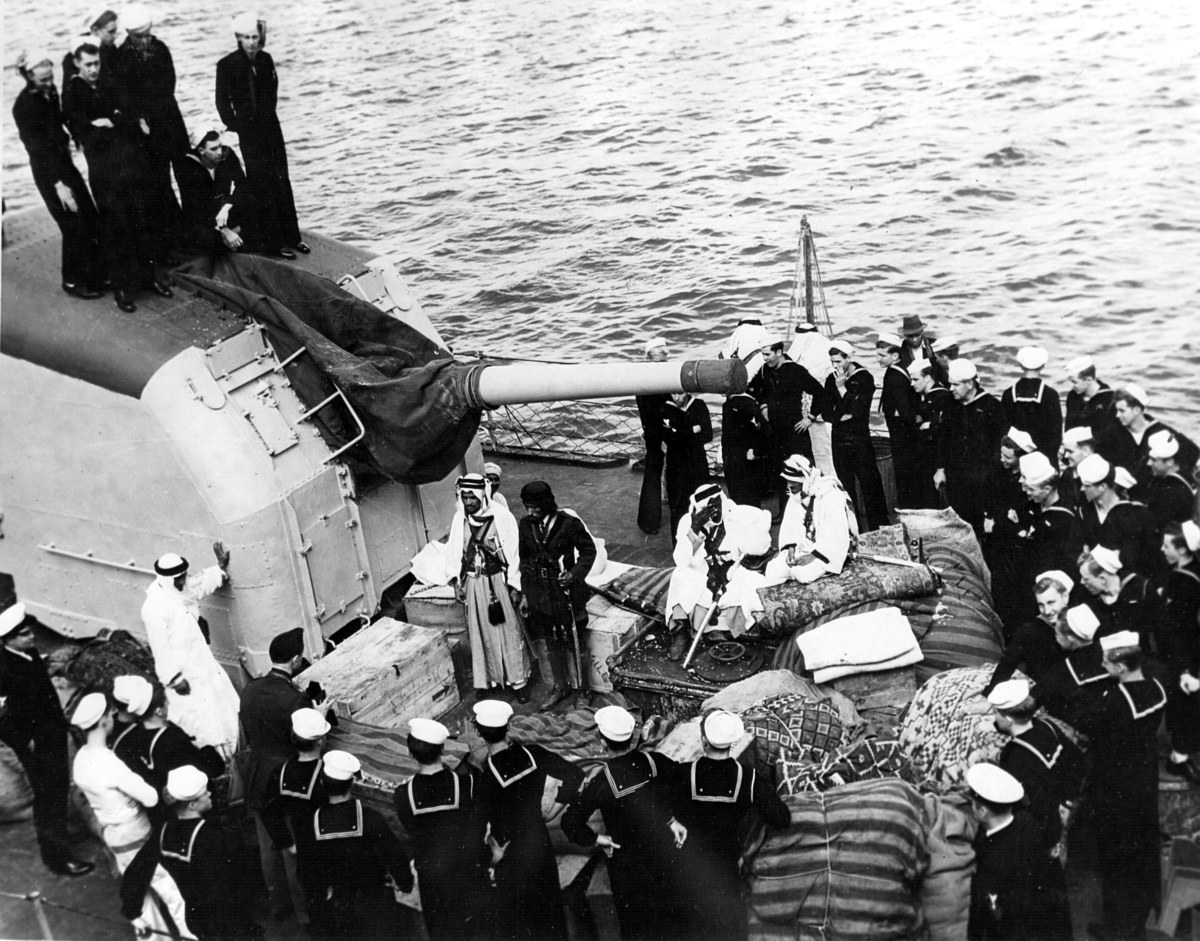
King Abdul Aziz's entourage aboard the USS Murphy on their way to the meeting between the King and Franklin D. Roosevelt at Great Bitter Lake, Egypt. (Franklin D. Roosevelt Presidential Library and Museum)
There was enough room on board to give these dignitaries cabins — the king had the use of the commodore’s. But the rest of the entourage — including the court astrologer, bodyguards and coffee servers — “bunked wherever they could find space, many sleeping in the gun turrets, wrapped up in their Arab robes in the scuppers, or curled up near the feet of the look-out on the bridge.”
The king did not actually sleep in the commodore’s cabin. “Bred and raised in the desert, four walls gave him claustrophobia,” Eddy recalled. Instead, “canvas was spread over the forecastle deck to convert it into a tent; oriental rugs covered the deck; one of his own chairs, large enough for him to sit in, had been brought aboard, and the King sat on deck and held his Majlis as usual all day long.”
At prayer times, “the ship’s navigator would give him the exact compass bearing for Makkah which the King would verify with his astrologer. Facing toward the holy city he would then lead the entire company of Arabs in their prayers.”
An account of the voyage from Jeddah to Suez was written by Ensign W. Barry McCarthy, a deck officer on the USS Murphy, and published in the March 19, 1945 edition of the US magazine Life under the headline “Ibn Saud’s voyage — US destroyer creates history with deck full of royalty, sheep and coffee-makers.”
McCarthy recalled arriving off Jeddah at 10:30 a.m. on Feb. 11, and his first impression of the town as “a flat, dusty looking collection of muddy-looking little buildings that sat huddled together on the sandy flat below the mountains.” Far to the right, “looking like a mirage, was one of the King’s palaces,” while to the left “a cluster of giant oil-storage tanks testified to the presence of western industry.”
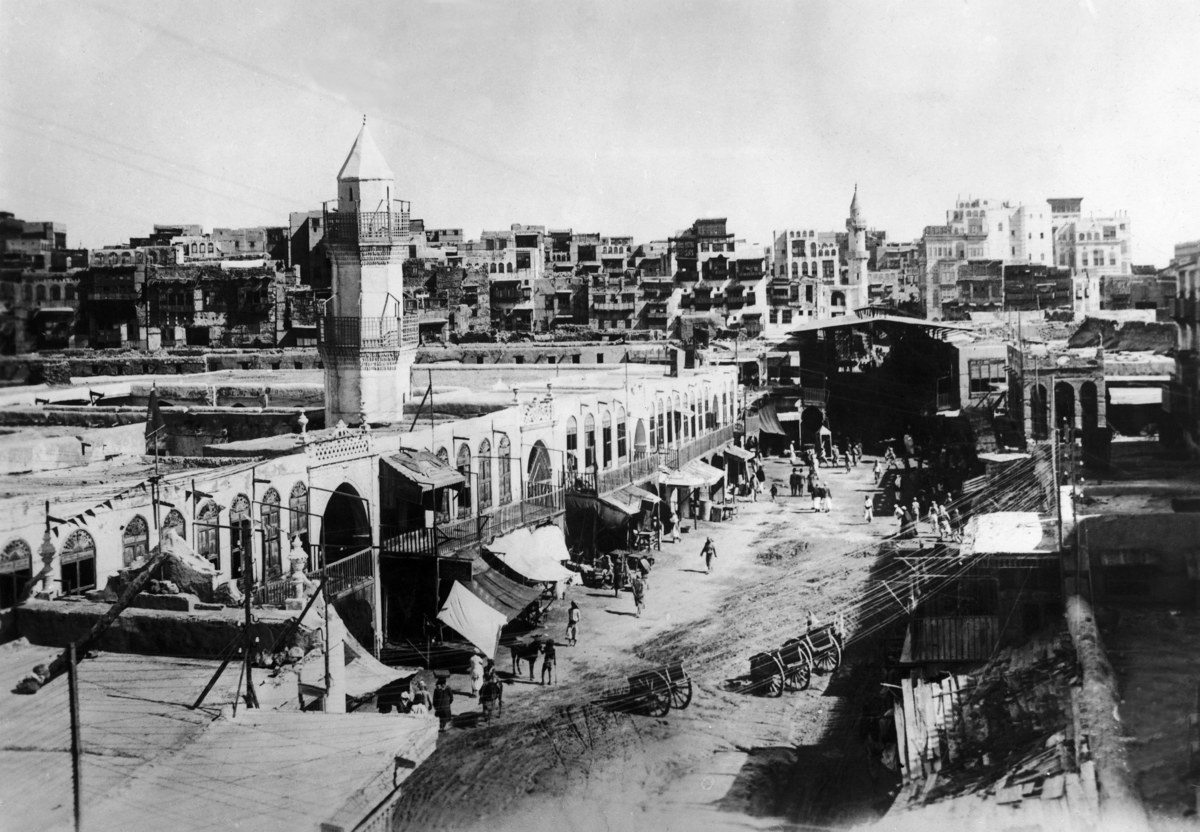
A Jeddah market in the 1930s. (Getty Images)
As the captain and his officers, wary of reefs and shallow water, pondered their approach to the harbor, a wooden dhow pulled alongside and a barefooted Arab “came bounding up our ladders, his face ... a hard leather color ... framed in a cropped black beard.”
The man introduced himself as Mohammed Ebraham Salamah, and as “a very good pilot” who before the war had worked for the British Blue Funnel shipping line. To compound his credentials, he told the officers his father had also been a pilot, and his great-grandfather before him. This, he added, was the first time a US warship had visited Jeddah — a story he could not wait to tell his father that evening.
With no other obvious choice, the captain accepted Salamah as his pilot, and “Mohammed took command of the ship with a laconic pronouncement: ‘I think we go ahead now’.” With that, McCarthy recalled, “he bounded off to the wing of the bridge, shouting some unintelligible order to his boat crew (and) then took stock of our position. He wasn’t interested in charts. He guided the ship by mountain peaks, reefs, marks on the beach and the color of the water.”
The USS Murphy dropped anchor 5 km offshore, where the water had become too shallow to risk going farther in. The captain and the commodore went ashore to pay their respects to the king and later returned with his ministers Yassin and Sulaiman, “who were to acquaint us with Ibn Saud’s needs.”
Chief among these was the construction of a tent on the deck of the destroyer. That night, the wood and canvas were brought out to the ship by dhow, and the ship’s forward 5-inch gun “was pointed to the sky to serve as a kind of center pole for the tent.” After the construction was complete, “to the men on the bridge who saw it from above, this tent was known as the ‘Big Top,’ and to those who built it, it was ‘The Hotel’.”
The next morning, the day of departure, the sheep arrived and “our stunned crew reacted with ingenuity,” McCarthy wrote. “Several men quickly improvised a sheep pen by stringing ropes from one depth-charge to another on the stern. Here, too, was stored the sheep’s feed, and here during the trip they were slaughtered and bled, hanging from the flagstaff.”
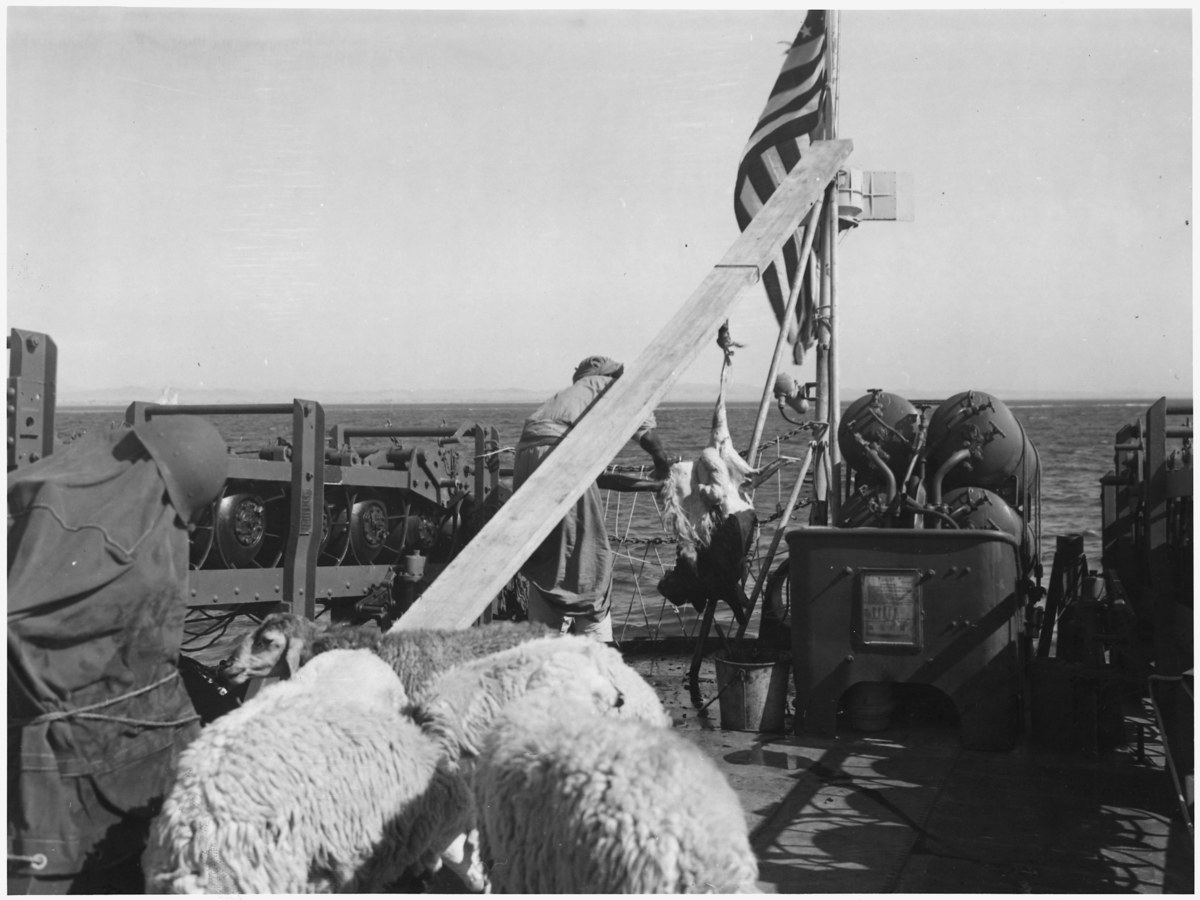
A herd of sheep was brought onboard the USS Murphy in preparation for the King's Suez journey. (Supplied)
The sheep were followed by 10 boatloads of royal belongings, including “royal gilded chairs, bundles of hay, large kitchen pots and giant silver platters.” Just before midday, when the king was due to board, the USS Murphy fired a salute — not from its 5-inch gun, now serving as a tent pole, but with shells from a 40 mm anti-aircraft gun.
McCarthy recorded for posterity the moment Ibn Saud came on board. “The crew manning the rails stood at attention as the (destroyer’s) whaleboat, piloted by the ecstatic Mohammed, pulled alongside,” he wrote. The boat was hauled slowly up and over the side of the ship, and “we noticed then that a charcoal fire was burning in the boat.” It was being used to heat coffee, the traditional Arabic gesture of greeting.
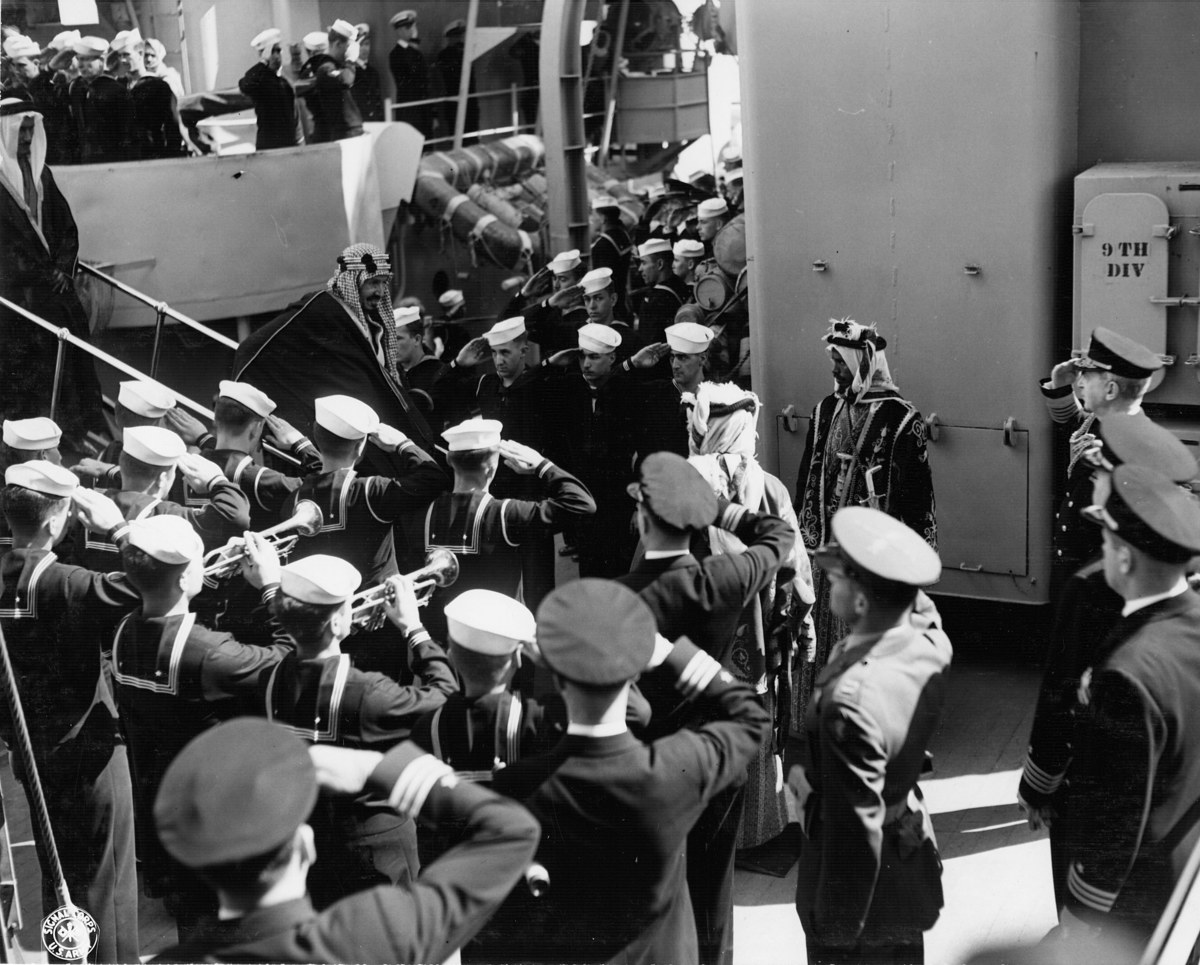
Ibn Saud arrives at the USS Quincy. (Franklin D. Roosevelt Presidential Library and Museum)
The king’s face, recalled McCarthy, “was impassive, as if all this was usual procedure for him. He simply rose to his full 6 feet and 4 inches (and) stepped out of the whaleboat to the deck.”
Journey to the Suez
A destroyer, built for speed and manoeuvrability but not for comfort, is not the most stable of ships in the best of seas. And with the wind on the nose as they traveled north, it was not an easy voyage.
“Ibn Saud showed no effects from the ship’s motion,” McCarthy noted. But while he refrained delicately from using the word “seasick” in his report, it was clear that not all in the group shared the king’s iron constitution. Members of his party “were poor sailors,” McCarthy wrote. “Our ship’s force was to have its work cut out for it, washing decks and bulwarks each morning.”
In Eddy’s account, the American sailors were “much more impressed and astonished by the Arabs and their ways than the Arabs were by life on the US destroyer. Neither group had seen anything like their opposites before, but the difference is that any such violent break with tradition is news on board a US destroyer; whereas, wonders and improbable events are easily accepted by the Arab whether they occur in the Arabian Nights or in real life.”
As Eddy explained for the benefit of his Western readers, “the Arab is by nature a fatalist and accepts what comes as a matter of course and as a gift from Allah, all of whose gifts are equally wondrous, undeserved and unexplained. The Arab gets off a camel and climbs into an airplane without any special excitement even though he has skipped all the intervening stages of the horse and buggy and the automobile.
“Allah gave the camel the proper equipment to walk on the sand and he gave the airplane wings with which to fly like a bird. There is, therefore, no reason to be astonished at the airplane any more than to be astonished that camels can walk or birds fly.”
During the voyage, the Arabs and the sailors “fraternized without words with a success and friendliness which was really astonishing. The sailors showed the Arabs how they did their jobs and even permitted the Arabs to help them; in return the Arabs would permit the sailors to examine their garb and their daggers, and demonstrate by gestures how they are made and for what purposes.”
‘The entire group sat cross-legged on the deck around the King who was in the best of humor and entertained the company with anecdotes of his battles’
During the trip, the king “learned to like a number of American dishes which he had never tasted before, although he continued to have his lamb and rice cooked by his own servants. He was particularly fond of our American apples and of apple pie à-la-mode and since that time American apple trees have been planted in the Al-Kharj agricultural experiment station.”
On the last night on board the USS Murphy, the king hosted the ship’s 21 officers at a meal. Eddy recalled the special moment: “The entire group sat cross-legged on the deck around the King who was in the best of humor and entertained the company with anecdotes of his battles; to their great delight, describing hand-to-hand combats and showing them one of his fingers broken years ago and still immobilized by a fragment of a Turkish cannon ball.”
In turn, the American warriors showed off their ship’s weaponry. During the day, the king was given a demonstration of anti-aircraft fire and of anti-submarine depth charges and, showing “keen interest in all phases of the ship’s armament ... posed willingly for photographs and movie shots of himself with the ship’s officers.”
The close quarters in which the ordinary sailors of the USS Murphy found themselves with the imposing Ibn Saud and his entourage led to some unforgettable moments. In an account published in 1993 in the monthly newsletter of the Saudi Embassy in Washington, Bosun’s Mate Thomas Hilliard, a veteran of the cruise, recalled coming face to face with the king.
“He was a very affable and considerate man,” Hilliard said. The sailor was in the bow of the ship, where the royal chair had been set up, when the king suddenly emerged from his tent. “He spoke to his translator who told me the King wanted to know if he was in my way while we were doing work. He was very considerate ... I told him no sir, and that he could have the forecastle.”
Black and white newsreel about the Suez conference shows Saudi King Abdul Aziz aboard the USS Murphy and his meeting with US President Franklin D. Roosevelt\
The king, it seems, was happy to indulge the crew’s natural curiosity about their exotic guest. Another sailor, Peter Tisa, apparently undeterred by Ibn Saud’s heavily armed bodyguards, approached him one day and, through his interpreter, asked him how he had become king. “He said he had to fight to unite the Kingdom and showed us his battle scars.”
As for the bodyguards, Keating later wrote that although they “looked as though they would get great enjoyment in carving unfriendly anatomies ... they became very friendly with the American sailors and turned out to be gentle and jovial.”
On the morning before disembarking, the king gave gifts to the officers and men of the USS Murphy. The commodore and the captain each received traditional Arab costumes and gold daggers.
In addition to costumes, each of the other officers were given a watch inscribed with the king’s name, and “over the loudspeaker it was announced to the entire crew that in appreciation of the many courtesies shown him on board, the King was giving to each Petty Officer fifteen pounds sterling, and to each seaman ten pounds sterling.”
Sterling was, of course, the currency of Britain, the Western nation with which Ibn Saud had had most dealings up until this point. A sailor standing near Eddy asked him: “Gosh, Colonel, how much is that in real money?” For the Saudis, as for the sailor, “real money” would increasingly be dollars.
In return for the king’s gifts, the captain of the USS Murphy gave Ibn Saud three souvenirs of his voyage that he had admired: Two submachine guns and a pair of navy binoculars.
The historic meeting
The destroyer tied up alongside the USS Quincy in the Great Bitter Lake at 10 a.m. on Feb. 14. The rails of the big cruiser, Eddy recalled, were lined by the crew, “but no salutes were fired as the meeting was to be conducted without alerting the neighborhood.”
The king, accompanied by his entourage, crossed the gangplank and met the president, who was sitting on deck. Roosevelt was not a well man. In 1921, at the age of 39, he had contracted a paralytic illness, thought to have been Guillain–Barré syndrome, which left him permanently paralyzed from the waist down and dependent upon a wheelchair for life.
Despite this, he campaigned successfully for the presidency, serving four consecutive terms from 1933. But his meeting with Ibn Saud was as timely as it was historic — the ailing president would be dead within two months.
On the deck of the USS Quincy, the king and the president chatted for an hour and a quarter — a convivial meeting captured in photographs, in which Eddy can be seen on one knee between the two men, acting as interpreter.
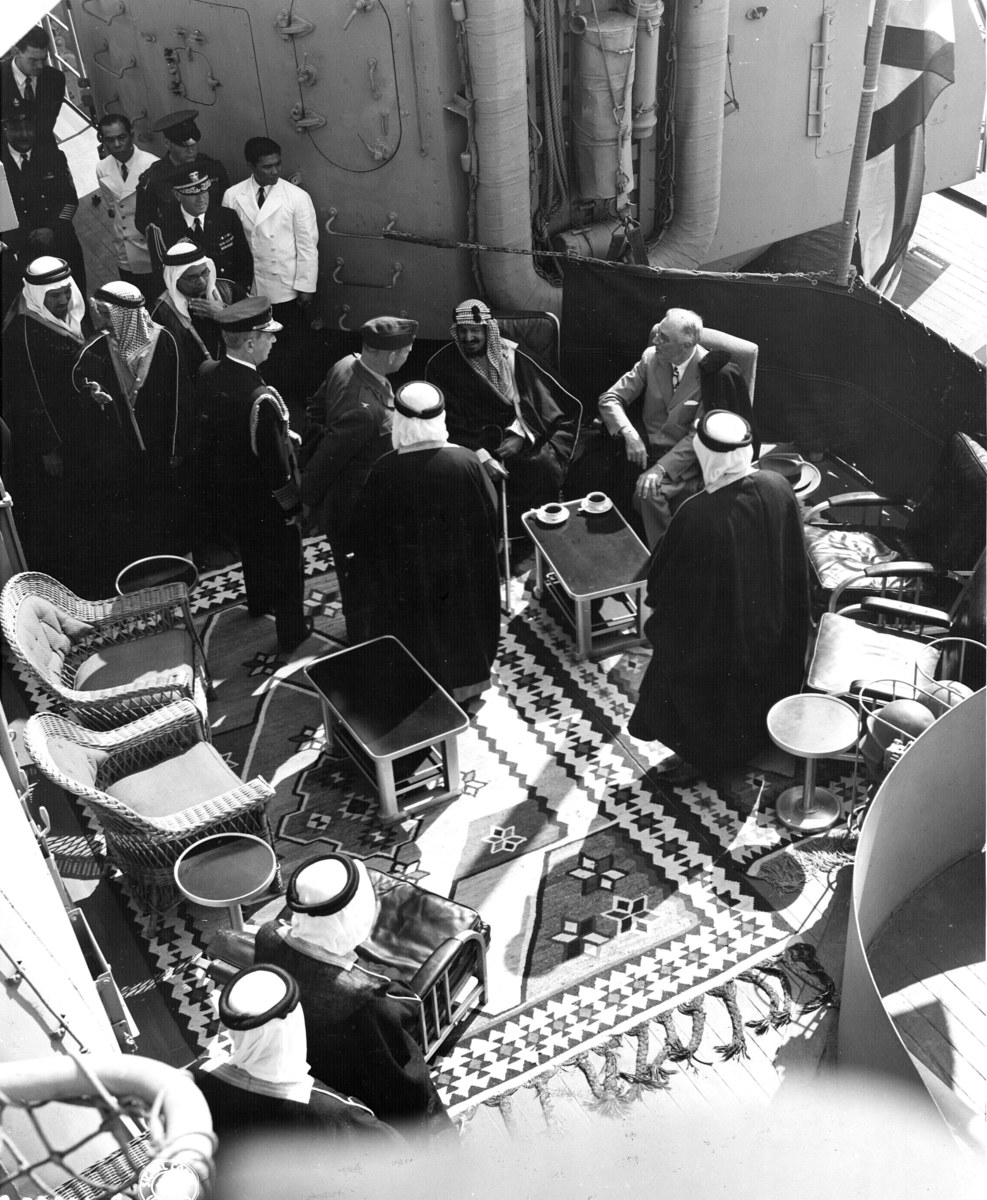
The meeting ended only when the captain of the USS Quincy arrived to say the ship must leave if Roosevelt’s convoy was to remain on schedule. (Franklin D. Roosevelt Presidential Library and Museum)
According to Eddy, after the formalities were out of the way, “the King right away asked the President whether he should accept Churchill’s invitation to see him later — an invitation which he thought might give the President displeasure.” Instead, Roosevelt said: “Why not? I always enjoy seeing Mr. Churchill and I’m sure you will like him too.”
At 11:30 a.m. the two men — accompanied by the royal party, Admiral Leahy, the most senior officer in the US Navy, and Charles Bohlen, the American diplomat and Soviet specialist who had served as the president’s interpreter at Yalta — went below for lunch.
After the meal, all but Roosevelt, the king, his deputy foreign minister and Eddy withdrew. The political conversation that followed continued until 3:30 p.m., and the king and the president “were thus together at least five very intense hours,” wrote Eddy.
The meeting ended only when the captain of the USS Quincy arrived to say the ship must leave if Roosevelt’s convoy was to remain on schedule. The king, wrote Eddy, said “this was impossible as the President must first come over to the destroyer, his temporary home, to be his guest at an Arab meal; that the establishment of a friendship such as this could not possibly be complete without his entertaining his friend and giving him Arab food.”
It was not to be. “The President explained that much to his regret the movements of the ship and the security clearances for the convoy were inflexible and the schedule must be maintained to the minute.”
The king was disappointed but understood, and then said to Roosevelt: “Will you at least drink a cup of Arabian coffee?” Orders were given, Eddy recalled, “and within a very few minutes the two resplendent coffee-servers, brushing past all of the guards, appeared in the President’s suite and poured cups of Arab coffee for the President and the King. The following day the President told me that no incident had touched him so much as the pleasure which the King showed on serving coffee from Arabia to his new friend.”
Eddy reported that the king and the president “got along famously together,” with Ibn Saud charming Roosevelt with the observation that “the two of them really were twins.” They were, he had pointed out, both heads of states “with grave responsibilities to defend, protect and feed their people, they were both at heart farmers, the President having made quite a hit with the King by emphasizing his interest in agriculture, and they both bore in their bodies grave physical infirmities — the President obliged to move in a chair and the King walking with difficulty and unable to climb stairs because of (war) wounds in his legs.”
‘The following day the President told me that no incident had touched him so much as the pleasure which the King showed on serving coffee from Arabia to his new friend’
Eddy recorded the conversation that followed, which led to the exchange of an unusual gift. Roosevelt told Ibn Saud: “You are luckier than I because you can still walk on your legs and I have to be wheeled wherever I go.” The king replied: “No, my friend, you are the more fortunate. Your chair will take you wherever you want to go and you know you will get there. My legs are less reliable and are getting weaker every day.”
At this, the president said: “If you think so highly of this chair I will give you the twin of this chair as I have two on board.” Immediately, wrote Eddy, the order was given and the chair was wheeled across the gangplank to the USS Murphy.
The gift left a lasting mark, Eddy recalled: “Whenever the King took friends through his palace at Riyadh, if they were close friends, he showed them his private apartment where his wheelchair rested with the White House tag still on it. The King always said, ‘This chair is my most precious possession. It is the gift of my great and good friend, President Roosevelt, on whom Allah has had mercy’.”
Later, Ibn Saud would come to use a wheelchair himself, and according to the King Abdul Aziz Foundation for Research and Archives, when he needed it he would ask his men to “bring the Horse,” his nickname for Roosevelt’s gift.

Roosevelt gifted Ibn Saud a wheelchair before they parted ways. (Supplied)
That night, Yassin and Eddy composed a memorandum of conversation, in English and Arabic. The king signed the Arabic text that night, after Roosevelt’s cruiser had gone through the Suez Canal and around the coast of Egypt to drop anchor for one day in the harbor of Alexandria.
Eddy flew to Alexandria with the memorandum the following day, Feb. 15, and Roosevelt signed the document without making any changes. A copy of the memorandum is held by the Office of the Historian at the US Department of State.
The content of the conversation between the king and Roosevelt remained unknown outside close diplomatic circles until Eddy’s account was published in 1954.
In his view, “such friendship depends wholly upon good will and good faith. When these died with FDR (Roosevelt) and were not revived by his successor, they cannot be resurrected by producing a piece of paper.” As Roosevelt’s guest, the king “initiated no topics (and) waited for his host to propose subjects for serious discussion.” Furthermore, “at no time did Ibn Saud even hint at economic or financial aid for Saudi Arabia.”
He had traveled to the meeting “seeking friends and not funds, in spite of the fact that, at that date, he had no reason to expect that Arabian oil would be produced in quantity to multiply his national income but, on the contrary, ruled in 1945 over a pastoral land which could not produce enough to feed its population, and a land cut off by war from importing the necessities of life.”
In fact, Saudi Arabia — cut off from trade and income from the annual Hajj by a war not of its own making, and with its embryonic oil industry yet to transform the nation’s fortunes — had already turned to the US for help. As early as October 1943, an agreement had been signed under which 5.167 million ounces of US Treasury silver would be loaned to the Kingdom’s government, “sufficient for the coinage of 15,000,000 riyals required to meet Saudi Arabia’s currency needs for the rest of 1943.”
According to a diplomatic note dated Nov. 1, 1943, Ibn Saud had “promised to return the silver ounce for ounce within five years after the end of the war.” America’s interest lay in the oil its experts were already helping the Kingdom to tap.
In exchange, “in the interest of the prosecution of the war,” the US government was “giving consideration to ways and means of assisting the California Arabian Standard Oil Company to construct a refinery in the vicinity of Dhahran.”
The immediate benefit of the meeting for both sides was an agreement that the US would provide Saudi Arabia with military aid in exchange for secure access to oil.
However, Roosevelt had another delicate subject he was anxious to raise with the king — “namely, the rescue and rehabilitation of the remnant of Jews in Central Europe who had suffered indescribable horrors at the hands of the Nazis: eviction, destruction of their homes, torture and mass-murder.”
Roosevelt had made clear his own commitment to the Zionist cause during the 1944 presidential campaign. The Democrat won over America’s Jewish voters with a statement read to the Zionist Organization of America on Oct. 15. “I know how long and ardently the Jewish people have worked and prayed for the establishment of Palestine as a free and Democratic Jewish commonwealth,” Roosevelt had said. “I am convinced that the American people give their support to this aim, and if re-elected, I shall help to bring about its realization.”
On board the USS Quincy, Roosevelt told Ibn Saud that he felt a personal responsibility for the ultimate fate of the Jews, “and indeed had committed himself to help solve this problem.” What, he asked, “could the King suggest?” Ibn Saud’s reply “was prompt and laconic: ‘Give them and their descendants the choicest lands and homes of the Germans who had oppressed them’.”
Colour footage, without sound, shows Saudi King Abdul Aziz and his entourage on their journey to meet US President Franklin D. Roosevelt aboard the USS Quincy in the Suez Canal. From the Franklin D. Roosevelt Presidential Library and Museum.
Roosevelt said the Jewish survivors of Nazi persecution in Europe had “a sentimental desire to settle in Palestine and, quite understandably, would dread remaining in Germany where they might suffer again.”
The suggestion surprised the king. “He said that he had no doubt the Jews have good reason not to trust the Germans,” Eddy reported, “but surely the Allies will destroy Nazi power forever and in their victory will be strong enough to protect Nazi victims?” After all, if the Allies did not expect to control future German policy, “why fight this costly war? He, Ibn Saud, could not conceive of leaving an enemy in a position to strike back after defeat.”
Roosevelt pressed on, saying he was counting on “Arab hospitality and on the King’s help in solving the problem of Zionism,” but Ibn Saud was adamant. “Make the enemy and the oppressor pay,” he said. “That is how we Arabs wage war. Amends should be made by the criminal, not by the innocent bystander. What injury have Arabs done to the Jews of Europe? It is the ‘Christian’ Germans who stole their homes and lives. Let the Germans pay.”
According to Eddy, Roosevelt then gave Ibn Saud two assurances — that he “would never do anything which might prove hostile to the Arabs and (that) the US Government would make no change in its basic policy in Palestine without full and prior consultation with both Jews and Arabs.”
To the king, Eddy noted, “these oral assurances were equal to an alliance; he did not foresee that Death was waiting in the wings to bear the speaker away before the promises could be redeemed.”
Roosevelt did not leave it at that. He repeated his double pledge in a letter to Ibn Saud — dated April 5, 1945 — just one week before his death. On March 10, 1945, the king had written to him after their meeting on the USS Quincy, stressing again his concern for the fate of the Arabs in Palestine.
In his reply, addressed to his “Great and good friend,” the president reassured Ibn Saud that he was “mindful of the memorable conversation which we had not so long ago and in the course of which I had an opportunity to obtain so vivid an impression of Your Majesty’s sentiments on this question.”
Roosevelt repeated his pledge that “no decision (would) be taken with respect to the basic situation in that country without full consultation with both Arabs and Jews.” He added that “it gives me pleasure to renew to Your Majesty the assurances which you have previously received ... with regard to the question of Palestine and to inform you that the policy of this Government in this respect is unchanged.”
But the words were already fading on the page. Roosevelt died on April 12, 1945. He was succeeded by Vice President Harry S. Truman, who would serve as president until 1953 and whose sympathies, informed by domestic political sensibilities, lay clearly with the Jews.
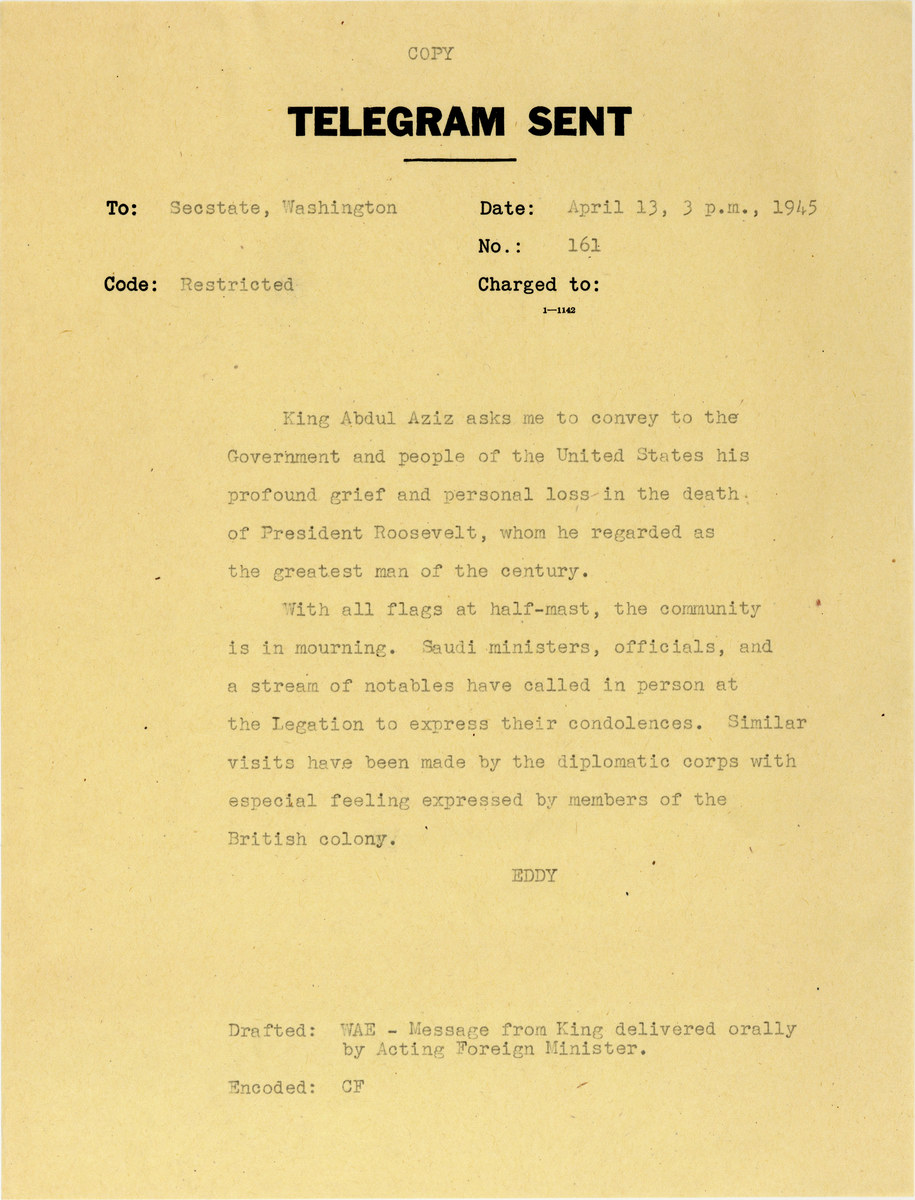
A copy of the telegram sent by Ibn Saud to the US government after Roosevelt's death. (Franklin D. Roosevelt Presidential Library and Museum)
Regardless, despite their differences over Palestine 75 years ago, Ibn Saud and Roosevelt laid the foundations of a friendship between their two nations that has endured to this day.
The aftermath
After the meeting, Roosevelt returned to Washington, where he lived just long enough to make one final address to Congress. He had, he said, “learned more (about Palestine and the Near East) by talking with Ibn Saud for five minutes than I could have learned in exchange of two or three dozen letters.” On Feb. 16, 1945, Roosevelt wrote to Eddy to say his meeting with the king was “so outstanding a success” as well as “a most interesting and stimulating experience.”
On board the USS Quincy, the king had left a number of gifts for Roosevelt, his wife Eleanor and their only daughter Anna. “There were several complete full-dress harim costumes, beautifully embroidered in many colors of silk,” wrote Eddy, and “several vials of rarely tinted glass, others of alabaster, containing the perfumes of Araby, including the favorite of all-attar of roses.”
There were also “large pieces of uncut amber, the like of whose size I have never seen, from the bottom of the Red Sea.” From the eastern coasts of Arabia, “there were pearl rings, pearl earrings, pearl-studded bracelets and anklets, and belts woven of gold thread with cunning devices, the skill which has reached its highest perfection in Saudi Arabia.”
The main present from the king to Roosevelt was “a beautiful diamond-encrusted sword.” It arrived too late to be taken by Eddy to Alexandria, but the next day, it was taken by special courier on an aircraft that caught up with the ship at its next stop, Algiers.
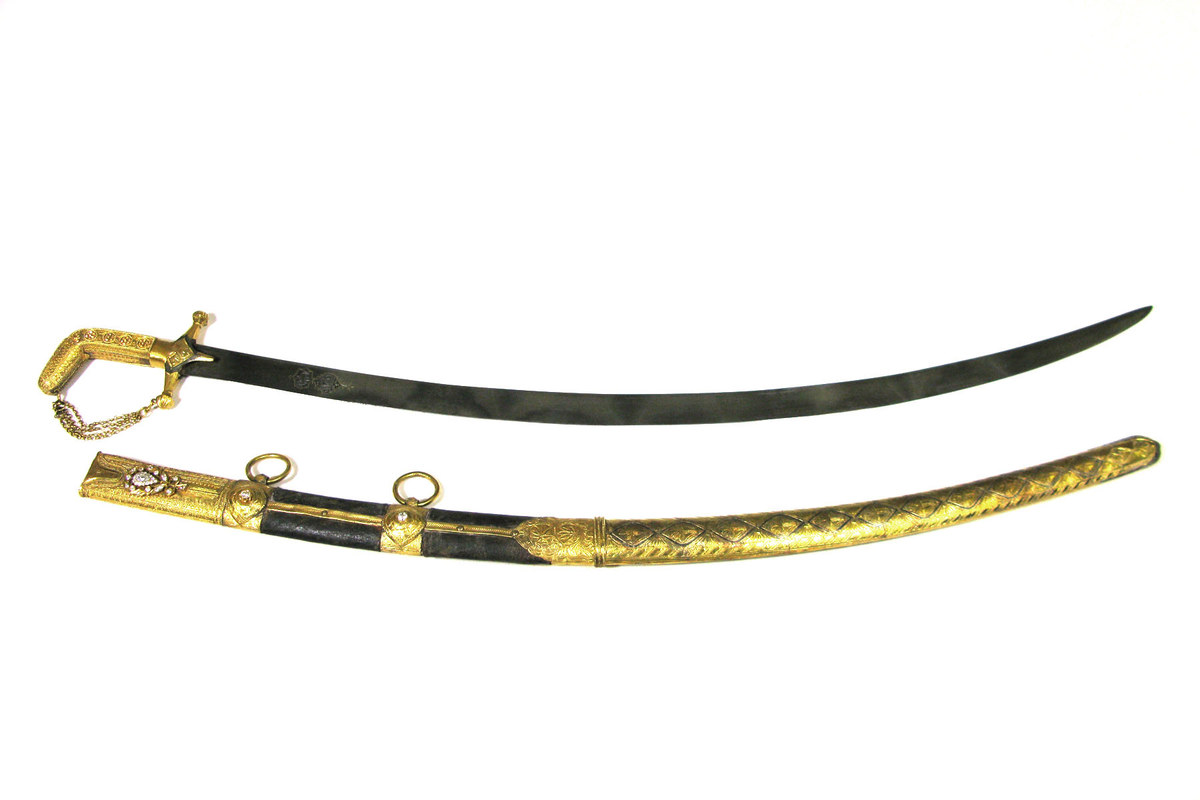
One of the gifts by King Abdul Aziz to Roosevelt and his family during their meeting. (Franklin D. Roosevelt Presidential Library and Museum)
Click here for a full gallery of King Abdul Aziz's gifts to the Roosevelts.
Eddy signed off his account with some thoughts on the significance of the meeting between the two great men that he had helped broker. For a start, it had been a significant first: Ibn Saud had left his country for the first time, and “since that day the doors have been swinging open to the previously closed culture of central Arabia.”
Roosevelt said he ‘learned more (about Palestine and the Near East) by talking with Ibn Saud for five minutes than I could have learned in exchange of two or three dozen letters’
As a result, “the guardian of the Holy Places of Islam, and the nearest we have to a successor to the Caliphs, the Defender of the Muslim Faith and of the Holy Cities of three hundred million people, cemented a friendship with the head of a great Western and Christian nation” at a meeting that marked “the high point of Muslim alliance with the West.”
In addition to his meeting with Ibn Saud, Roosevelt took advantage of his voyage to meet with King Farouk of Egypt and Emperor Haile Selassie of Ethiopia. This unprecedented round of diplomacy broke the European stranglehold on the Middle East.
When Churchill learnt of the meetings, he quickly followed in Roosevelt’s wake and met Ibn Saud at Fayoum Lake near Cairo. The British, Eddy wrote, had told the king that “whereas the Americans had taken him to the Suez Canal on a destroyer, they were going to return him on a cruiser, HMS Aurora, indicative of the greater prestige of Great Britain.”
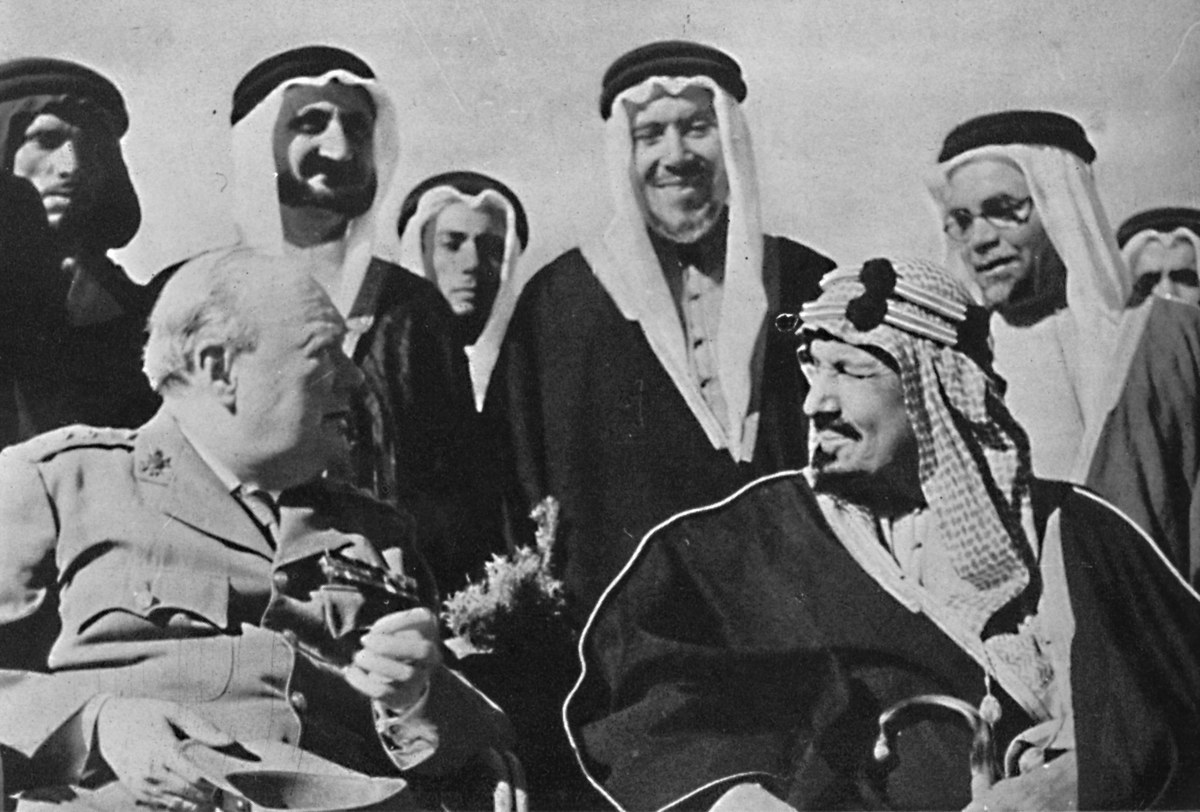
Among other Middle East rulers, King Abdul Aziz met with then British Prime Minister Winston Churchill, south of Cairo, in February 1945. (Getty Images)
But the king told Eddy that he “did not enjoy his return trip to Jeddah … his return trip was very dull — the food was tasteless; there were no demonstrations of armament; no tent was pitched on the deck; the crew did not fraternize with his Arabs; and altogether he preferred the smaller but more friendly US destroyer.”
(With reports from Lojien ben Gassem)



